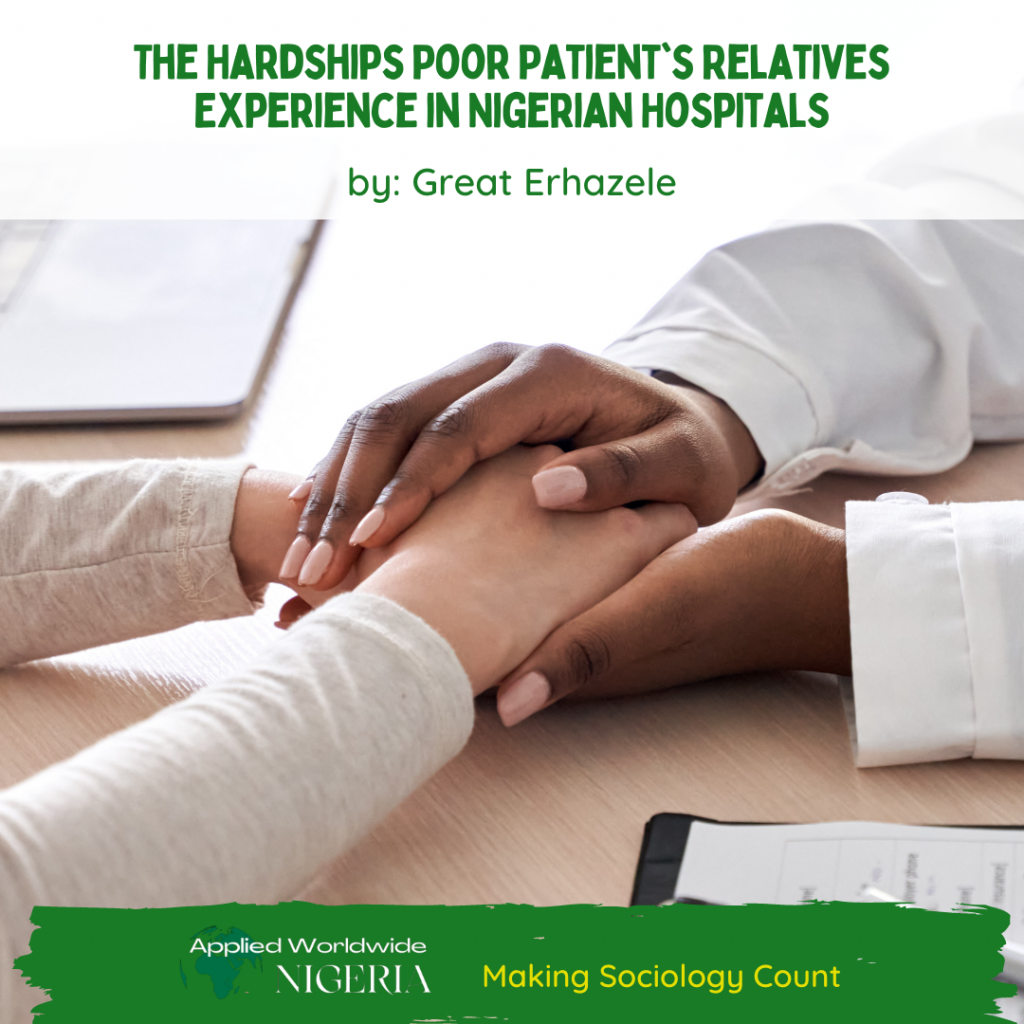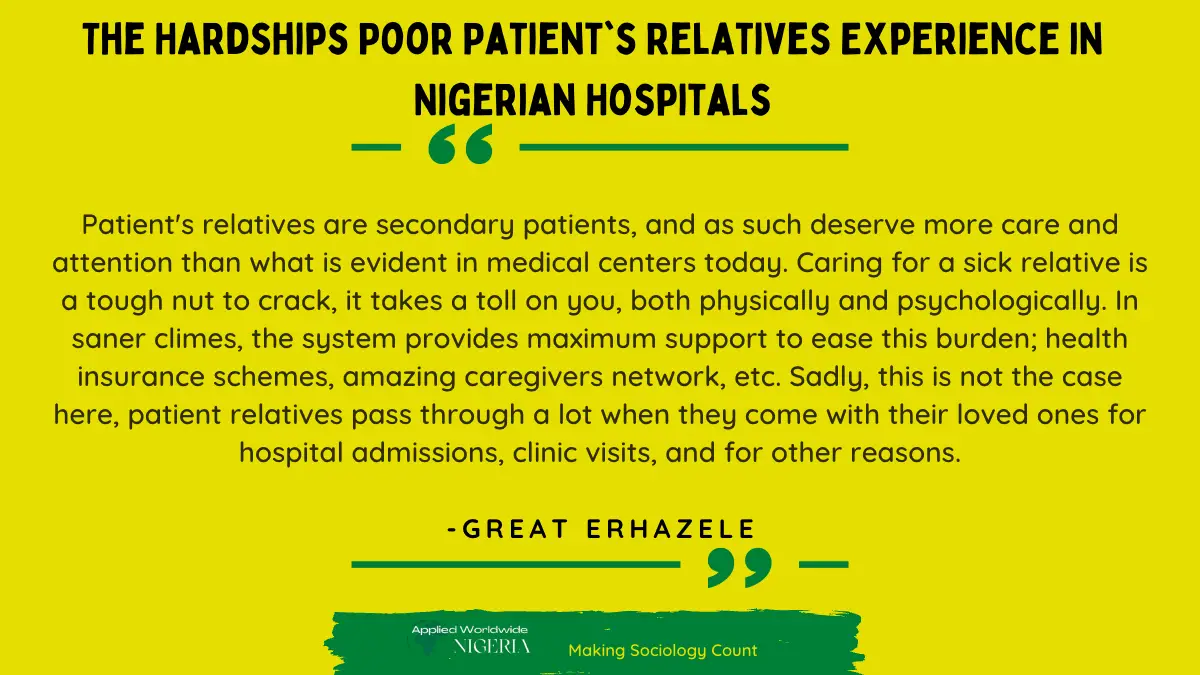Nigeria’s health sector is suffering and if care is not taken, her condition is only going to get worse. Like a poor child suffering from undiagnosed Arthrogryposis Multiplex Congenita (AMC- a non-progressive condition that is characterized by joint stiffness and limited range of motion), the health sector is not ‘working.’ The challenges are grave, complex, and unfortunate: from
grossly insufficient funding, and paucity of healthcare professionals, to poor infrastructures, all made worse by the presence of a Government that does not consider healthcare its priority. The result of this quagmire is a deficiency in quality healthcare delivery in the country. Poor patients suffer the brunt of this – a common case in healthcare establishments. The patient’s relatives also suffer – however, their issues are sadly, often overlooked.

Patient’s relatives are secondary patients, and as such deserve more care and attention than what is evident in medical centers today. Caring for a sick relative is a tough nut to crack, it takes a toll on you, both physically and psychologically. In saner climes, the system provides maximum support to ease this burden; health insurance schemes, amazing caregivers network, etc. Sadly, this is not the case here, patient relatives pass through a lot when they come with their loved ones for hospital admissions, clinic visits, and for other reasons.
In a working system, most of these challenges are non-existent. These challenges include; terrible customer service, and exclusion from decision-making in the management of their loved ones (the disease symptomatology, progression, treatment options, and prognosis). Poor welfare as patient relatives shower in the open, sleep on benches or the cold hard floor and are in the process exposed to wild creatures. They are also vulnerable to thieves, and unscrupulous fellows who take advantage of their ignorance and exploit them. Many families have unpleasant memories of using the hospitals in Nigeria and this has resulted in an aversion to seeking health care in the country.
I have come across several individuals with bad stories to tell of their hospital visitations; deep-rooted resentment, fear, and sadness abound in their views. Some vow never to come back to seek care, preferring to find alternative help whenever they or their family members fall ill. Others are filled with trepidation and would do anything to delay or avoid coming for help. It’s
crazy but who can blame them?
A close friend once shared her personal experience of how her health challenges began shortly after returning from a prolonged hospital stay when her younger brother was admitted. She could only trace the cause of her illness to the terrible conditions she was forced to live in during the dark three months of admission. She had to sleep on a mat beside her brother’s bed every night, run about the hospital in the dead of night for medications, laboratory tests, or making payments, and eat unhealthy meals from food vendors. Yes, it was for family, and family is everything. But we must not glorify needless suffering, especially when it is possible to do better.
Substantial policies are currently lacking in our health sector and this is a huge reason, though not the only one. We’re in 2022, but our healthcare system is still trying to come to terms with what medicine is all about – providing inclusive, holistic, patient-centered care – for primary and secondary patients alike. Catering to one and ignoring the other leaves a lot to be desired.
Thankfully, these issues can be easily addressed, but only if our health sector believes in the existence of the problem. Intentional steps are required, the people have lost faith in the system over the years and this, if done right, might be a good way to start restoring hope.
Proposed Solutions to the The Hardships Poor Patient’s Relatives Experience in Nigerian Hospitals
• The government through the legislature and health ministries has to develop health policies that are practicable, these strategies should contribute to the comprehensive care of patients and their family members in the hospital. Our health institutions require ample funding, and the Government of the day has to do better.
• Hospital management must acknowledge these issues and address them by providing good accommodation where patient relatives can rest for free or at subsidized rates. They should also provide quality convenience areas, washrooms, restaurants, and relaxation centers. There should be enough pay points for transactions, and visible signposts giving directions to important units of the health facility.
It’s always sad to see some of these patients and their family members wander about because they can’t find a particular part of the facility. Google maps should be updated and encouraged. More hospital staff are needed to provide security and run errands like taking samples for tests or retrieving results and getting medications and other equipment. Better customer service to resolve complaints, and protect staff and clients, wouldn’t hurt either. Servicom services are already present in most Government-owned hospitals, they should do better and if possible, be extended to private establishments.
• NGOs, private partners, and well-meaning individuals can also come in to assist. Providing new buildings or renovating the old ones for accommodation, or donating equipment for the buildings. They can also provide training sessions and outreach programs to healthcare workers to improve their relationship with patients and patient relatives. These sessions/programs should also be extended to the patients and their family members.
These solutions, when applied, will bring about positive changes in this facet of our health care. The benefits include a reduction in the hostility towards health workers and aversion to seeking quality health services in the right centers, and the populace is healthier. Although the implication of holistic secondary patient care is the provision of potentially intensive and complex services that require additional resources, it proves valuable in the long run – to the patients, their families, the system, and our society. The importance of family in patient care remains critical to attaining a healthy Nigeria.





